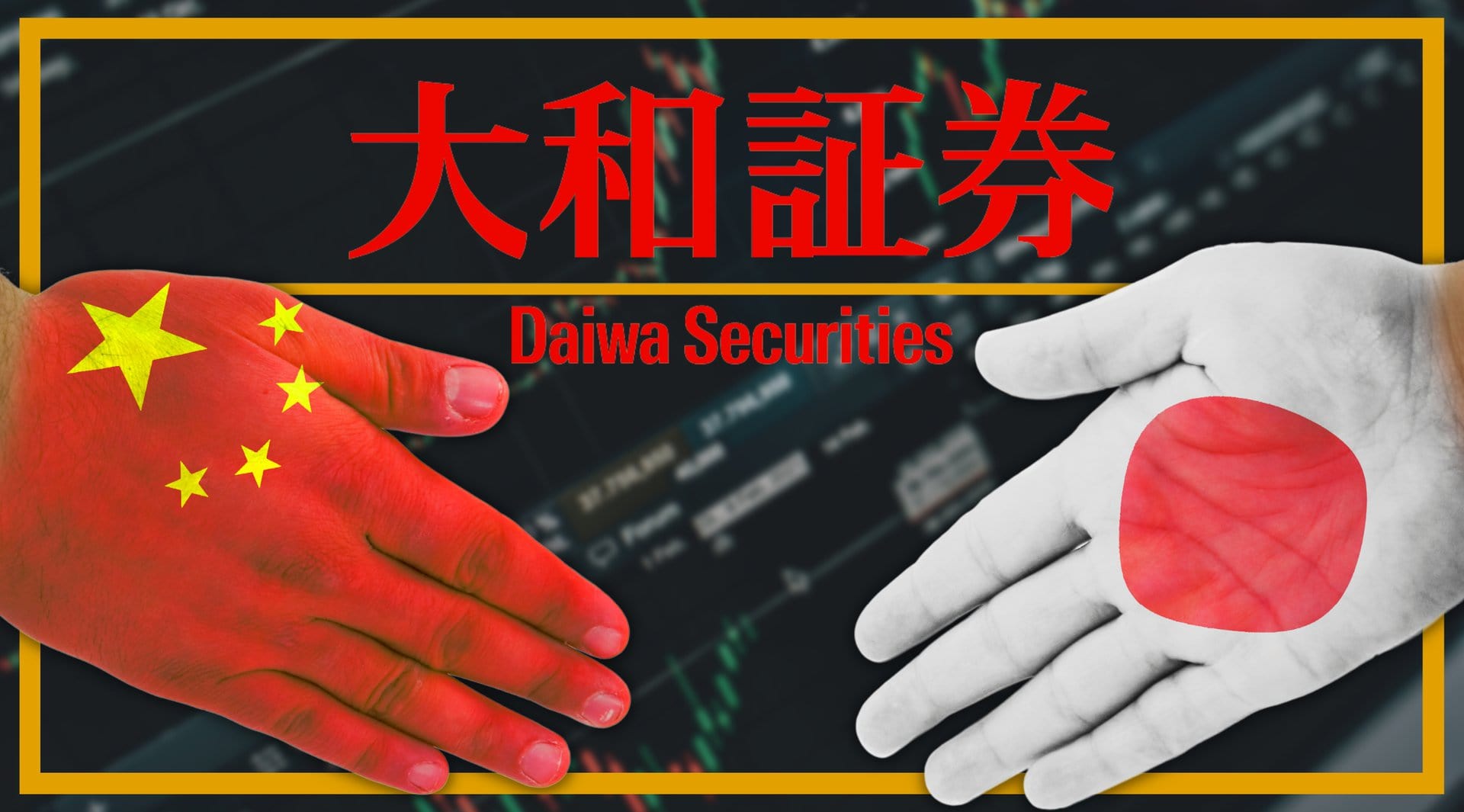The higher interest rate environment has been cruel to banks and brokers across the world. Japanese giants Nomura and Daiwa Securities are no exception. Daiwa and its larger rival were exposed to the contagion and tightening that followed the Silicon Valley Bank (SVB) and Credit Suisse crises.
Daiwa’s share price was approaching a one-year high, before a precipitous drop after the chaos left bondholders with masses of unrealised losses. Daiwa’s wider strategy is based around transitioning to a wealth management business, relying less on brokerage revenues as spreads narrow in both its retail and wholesale business. Yet perhaps most interesting was the 2021 move to enter the Chinese market. With the fractious geopolitical backdrop between Japan and China as the US advances its semiconductor isolation of the latter, how is Daiwa’s Sino venture progressing?
Entering China
Daiwa Securities signed a memorandum of understanding with the Beijing State-Owned Capital Operation and Management Center to set up a securities joint venture when it reentered China after a four year hiatus in 2021. Daiwa owns 51% and Beijing State-Owned Capital, an investment vehicle backed by the municipal government, 49%. Nomura followed suit with a similar arrangement, even as the first signs of President Xi’s onerous Covid-19 policies and the real estate debt crisis were taking shape.
Yet what might have looked a bad bet in the years that followed may have strong prospects in the next few. Xi’s clampdown on private businesses has been reversed in what some see as a reaction to American belligerence, or what others see as the result of his weaker position in the Chinese Communist Party (CCP).
“The fact that the CCP’s posture towards the pandemic has now completely reversed after a popular uprising can only mar Xi Jinping’s carefully cultivated air of infallibility,” said Orville Schell. #China https://t.co/JrjPNFrxlS
— William Yang (@WilliamYang120) January 1, 2023
Moreover, Chinese capital markets have been unleashed thanks to the lifting of the zero-Covid policies, enabling an environment for growth. China’s mainland markets are seeing the boon already. About 1.3 trillion yuan (US$190 billion) worth of shares changed hands on the Shanghai and Shenzhen stock exchanges on April 4, the highest since last June.“The surging A-share turnover signals that a new bull market is about to take off,” Yingda Securities’ chief economist Li Daxiao said in a social media post on Thursday. In addition, China’s new IPOs surged upon relaxing of mainland listing rules. But Daiwa face competition from Tier One giants such as JP Morgan and UBS in the battle for Chinese deals and volume.
There are now 10 foreign-owned securities firms onshore in China, including Daiwa. According to data from the Securities Association of China, 140 securities companies in onshore China realised revenue of CNY 502.410 billion($74.05 billion) and net profit of CNY 191.119 billion($28.17 billion) in 2021. As of the end of 2021, the total assets of the securities industry were CNY 10.59 trillion ($1.56 trillion) and the net assets were CNY 2.57 trillion ($0.38 trillion). The market in which Daiwa is operating is clearly not an insignificant one.
Brokerage to Wealth Management
The initial venture in China launched with 35 private bankers focusing on investment banking, brokerage, and fixed income, crucially missing out on the license to provide wealth management services to a growing number of affluent citizens. “As we expand from here on, we want to think about establishing a foothold in areas such as Shanghai and applying for different licenses,” including asset management, said Daiwa’s CEO at the time.
Japan-based Daiwa Securities recently received approval from China's securities watchdog. It will be the seventh foreign securities firm to set up a majority-owned joint venture in the mainland, as the country steps up efforts to open the financial sector. https://t.co/wRYEWpjC9P
— Global Times (@globaltimesnews) August 31, 2020
Two years on, Daiwa has no such license, despite Blackrock receiving one. While the $10 trillion asset manager can leverage its weight with the Chinese government, Daiwa and Nomura lie on more delicate footing due to the relations between both nations. China and Japan’s foreign Ministers met this month with China marking the 50th anniversary of the bilateral peace treaty with words of warning. “Today the US has repeated its tricks on China. As the saying goes, do not do unto others what you don’t want done unto you. As the keenly-felt pain still stings, Japan should not help a villain do evil,” Qin Gang told his opposite number.
As the US increases its squeeze on China’s semiconductor supply chain, Japan seems to be caught between a rock and a hard place. For its two investment banking behemoths, any new licenses to go from sell-side to buy-side might impinge on the actions of the state. Japan are of course more closely aligned to the US in the world order, but recent movements have seen bilateral relations between their neighbours improve, exemplified by this cross-pollination in capital markets.
Opening Up for Business
As Xi battles American sanctions and a real estate debt crisis, he is left with no choice but to assuage Wall Street and let foreign capital flow into the country. Last week, a flurry of top financial executives visited China for the first time since the COVID-19 pandemic. Goldman Sachs CEO David Solomon, HSBC CEO Noel Quinn, and Standard Chartered boss Bill Winters are among the executives to have held face-to-face meetings with Chinese officials and regulators in the last week. China Securities Regulatory Commission (CSRC) head Yi Huiman has also met senior executives from Daiwa Securities, as well as Bridgewater Associates, HSBC, and Goldman Sachs in Beijing.
Global finance CEOs make first post-COVID visits to China https://t.co/kjydNAOmyV pic.twitter.com/OKMd3uxUw4
— Reuters Asia (@ReutersAsia) March 31, 2023
Financial institutions are bullish on China, but competition is fierce. Yet in 2021, only five of the foreign and jointly owned securities firms were profitable. High labour costs and restricted business licenses are the main constraints. Now that Chinese regulators are more receptive, that could change in 2023.
Daiwa Securities stands in good stead to take that mantle as a regional powerhouse. But it cannot compete for resources with wealth management powerhouses like BlackRock, Blackstone, and UBS Wealth Management, even if it receives a license. And while a bipartisan agreement on a hawkish stranglehold on China will remain, there appears to be no problem with America and its allies allowing financial institutions to launch joint venture on the Chinese Mainland.
In a year where we’ve seen the partial uncoupling of Western finance and Russia, it seems that there are limits to the grip geopolitics has on Western-allied financial institutions. For Daiwa, that means it can continue to search for the pockets of wealth created by China’s rapid economic growth.
Author: Tal Feingold
#Daiwa #Securities #China #Japan #Beijing















